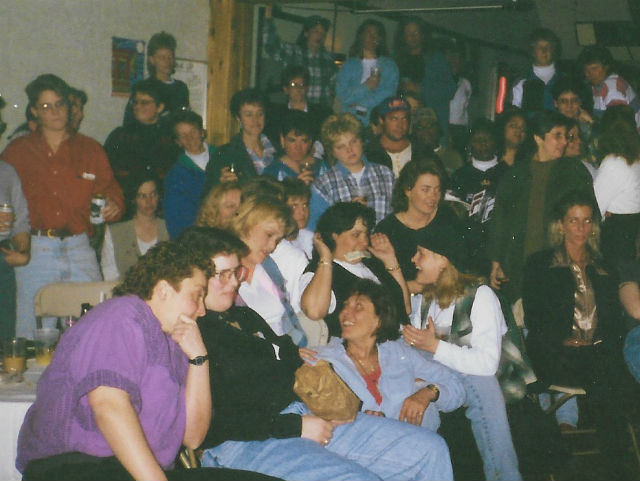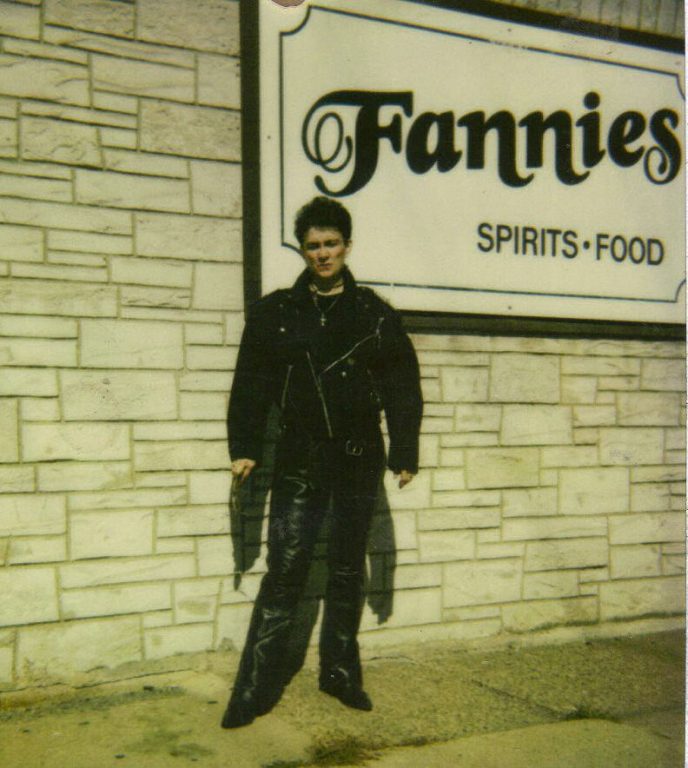Milwaukee’s LGBTQ+ Community Gathers to Celebrate a Pioneer
After decades of Sharon Dixon supporting the community, they’re returning the favor.

From left to right, Diane “Legs” Gregory, Karen Valentine and Dianna Jones perform at a fundraiser for LGBTQ+ pioneer Sharon Dixon on March 30, 2025 at La Cage nightclub in Milwaukee. Cormac Kehoe/Wisconsin LGBTQ History Project
On an afternoon in March, generations of Milwaukee’s LGBTQ+ community and allies gathered at La Cage nightclub to celebrate a living legend. It was a reunion, a tribute and a fundraiser — all in honor of Sharon Dixon.
In the decades that followed, Dixon went on to own many other popular LGBTQ+ women’s bars and clubs in Milwaukee, including Shorty’s Party Room, Fannie’s and, most recently, Studio 200.
But in 2023, her home and business at Studio 200 was sold and demolished after she unknowingly signed it away. Dixon found herself without housing, and at the age of 73, she resorted to living on the street.
Now, after decades of Dixon taking care of Milwaukee’s LGBTQ+ community, they’re coming together to do the same for her.
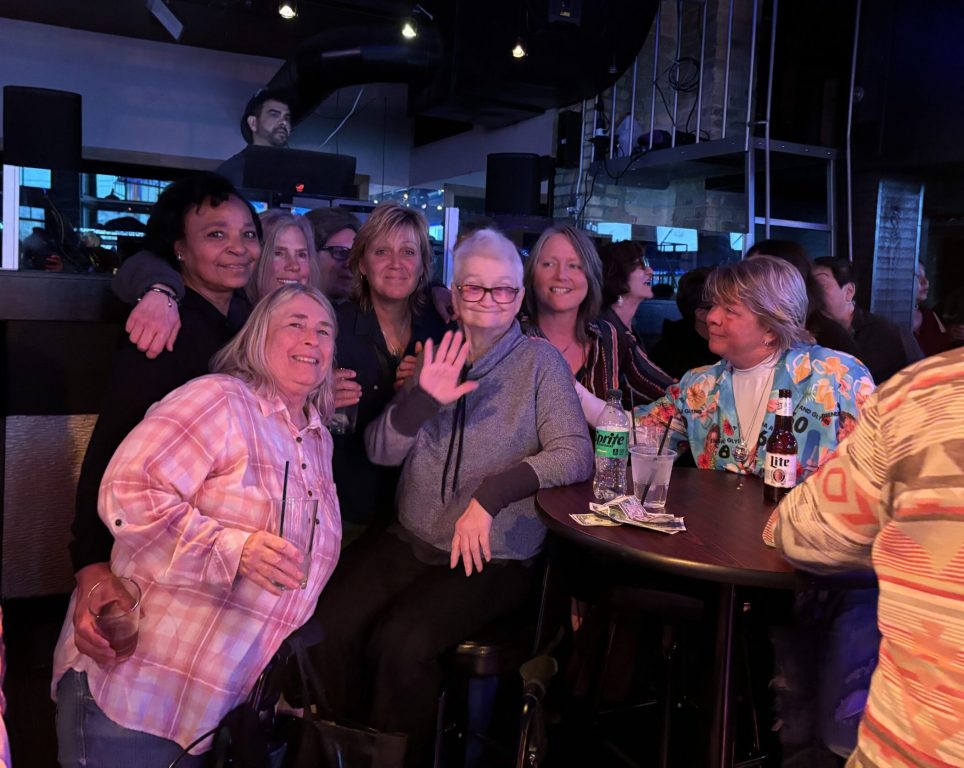
Sharon Dixon waves at the camera, surrounded by old friends and patrons of her past LGBTQ+ women’s bars, at a celebration in her honor on March 30, 2025 at La Cage nightclub in Milwaukee. Beatrice Lawrence/WPR
The party and fundraiser, organized by the Wisconsin LGBTQ History Project, brought together old friends and bar patrons to raise money for Dixon’s housing and medical care.
The purpose of the event, in the words of Dixon’s friend Rochelle Ciucci: “Show her that the 50 years that she supported all of us hasn’t gone unnoticed.”
From teenage runaway to business owner
When Dixon left her small rural town of Hurley, Wisconsin and headed for Milwaukee, she was just 14 years old. With nowhere else to stay, Dixon recalls spending some nights at an X-rated movie theater for 25 cents.
“You can’t beat that price,” Dixon told WPR’s “Wisconsin Today.” “We didn’t have any of those up north.”
Over the next couple of years, Dixon worked odd jobs, traveled around the country and came out as a lesbian. She began hanging out in Milwaukee’s growing LGBTQ+ bar scene and working as a bouncer, bartender and cook.
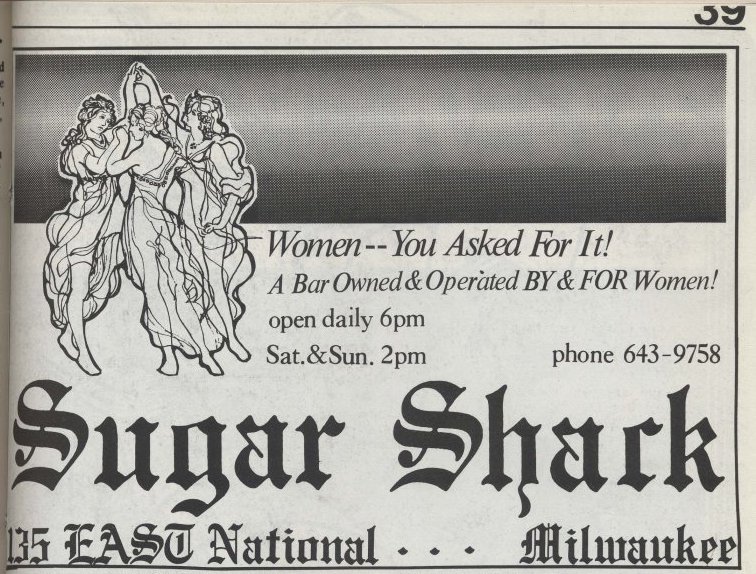
A July 1976 advertisement for the Sugar Shack in GPU (Gay People’s Union) News. Photo courtesy Wisconsin LGBTQ History Project
In 1975, Dixon made history along with her partner, JoAnn Kilsdonk, by opening the Sugar Shack, Milwaukee’s first women-owned women’s bar. While lesbian bars existed in Milwaukee, they were owned by men, Dixon said.
“There truly wasn’t, back in those days, any place for women to hang out and feel safe,” Dixon said.
Although the Sugar Shack was a women’s bar, all were welcome.
“[Sharon] got along very well with both genders. A lot of the women’s bars did not necessarily want men in their bar,” said Karen Valentine, a drag queen who emceed Dixon’s tribute event.
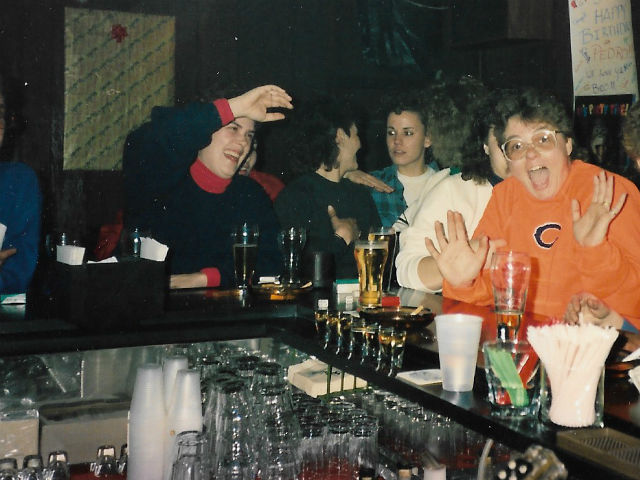
Customers at Sharon Dixon’s women’s bar, Fannie’s, sit at the bar. Fannie’s was open from 1983 to 2002. Photo courtesy Mary Connell
Still, some men were threatened by the Sugar Shack being “owned and operated by women, for women,” as the bar’s slogan said.
“Some of the guys kind of took it wrong. They were like, ‘Oh, you don’t like men.’ I said, ‘I like men, as long as they keep their paws off me!’” Dixon said.
The only people who were not welcome at the Sugar Shack were the college-aged bullies who would come to the bar to harass patrons.
“[They] would come in and want to pick on the lesbians or any woman that was in there, and if there was a guy in there, they were even worse with the guy,” Dixon said. “But we all stood up for ourselves.”
A legacy of generosity
Dixon’s friends describe her as incredibly generous, helping out her patrons and employees whenever she could.
She sponsored baseball and softball teams for her customers. Dixon herself remembered leaving care packages on doorsteps of women who she knew were struggling, and gathering bedding for people living in shelters.
“We always tried to support them because a lot of my customers were people that went through some of the same stuff I did,” Dixon said.
And Dianna Jones, a longtime customer of Dixon’s, recalled how she was one of the first people to step up to organize businesses in support of the community during the HIV/AIDS epidemic.
“She would shut down the whole block. All the surrounding bars would join her, and we’d have big outdoor fundraisers with variety shows, drag queens, dancers and singers,” Jones said. “It feels really good to be here for her because she gave so much to our community.”
In 2023, Dixon was recognized by the Milwaukee County Board of Supervisors for “her dedicated efforts and contributions to the LGBTQ+ community.”
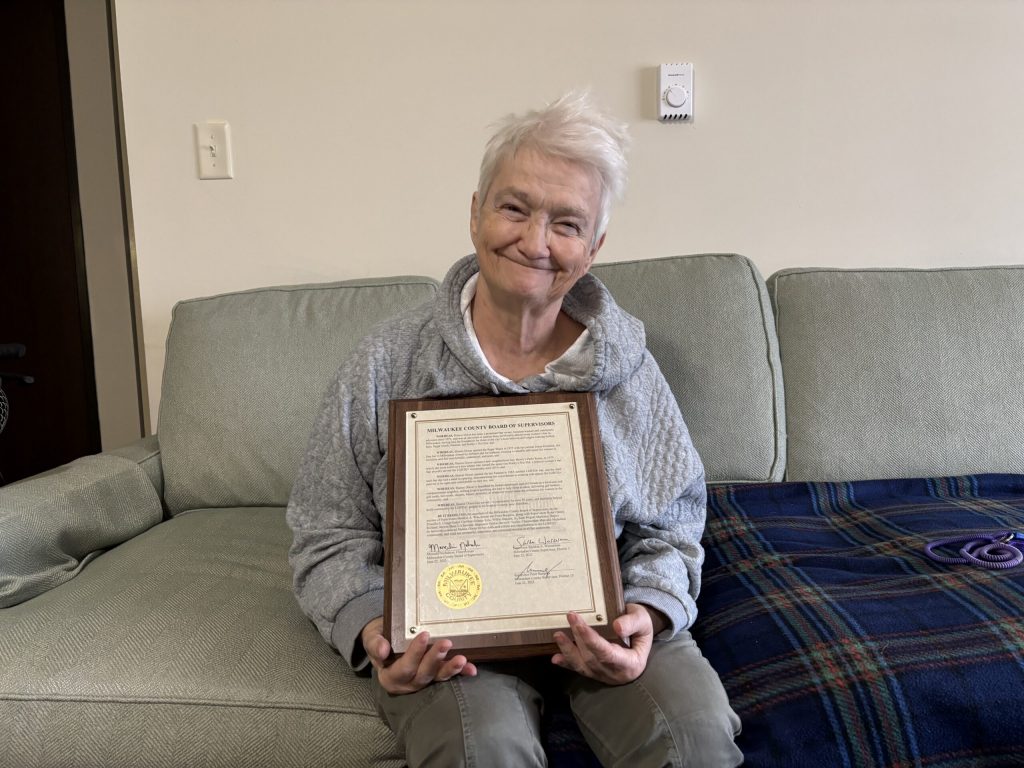
Sharon Dixon poses with a plaque from the Milwaukee County Board of Supervisors recognizing her contributions to the LGBTQ+ community, at her apartment in Franklin. Beatrice Lawrence/WPR
‘As tough as nails,’ in need of help
In 2011, after a decade of several name and concept changes, Dixon turned the building where Fannie’s once was into Studio 200, an LGBTQ+ electronic music club.
Studio 200 closed in 2018, but Dixon continued living in the building as she had for decades.
In 2023, Dixon was served with an eviction notice, forcing her to move out of the building that was once home to Studio 200. At some point, she had unknowingly signed her building over to a trusted figure in her life, whose role included providing her with paperwork.
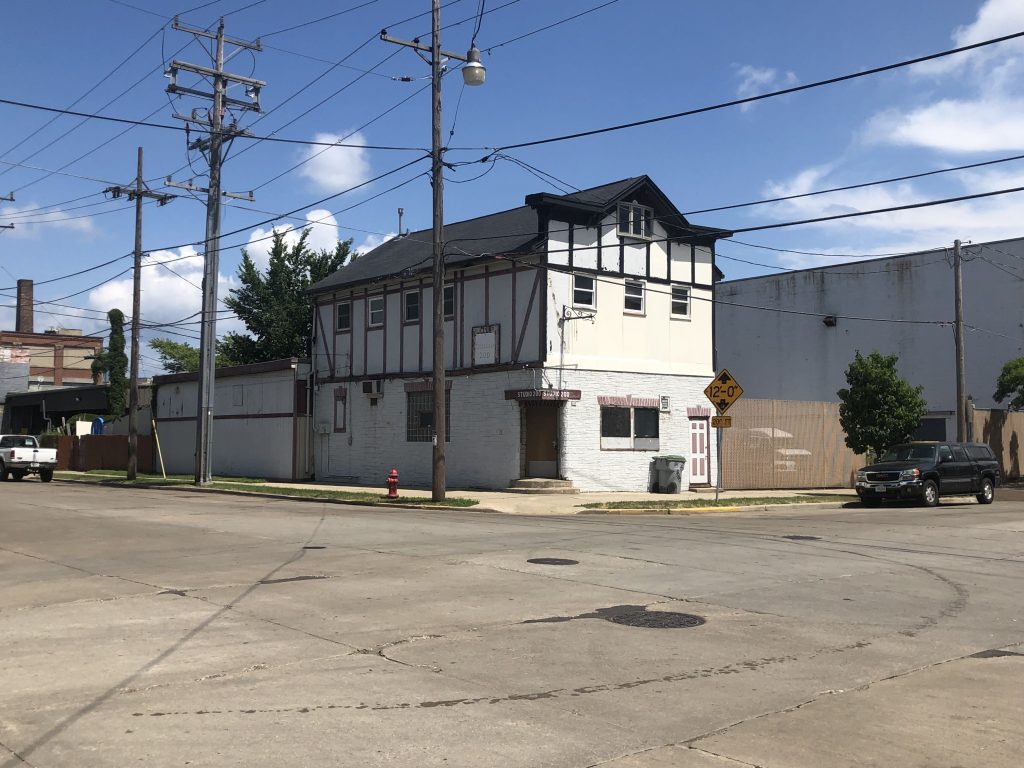
The building at 200 E. Washington St. in Milwaukee, which was the home of both Fannie’s and Studio 200, before being demolished. Photo by Jeramey Jannene.
Dixon’s friends, including Jessica Fenner, came to her aid. They put her belongings in storage and connected her with housing services, hoping it would lead to a new permanent living space.
“What we really found was a real gap in the so-called safety net that social services is supposed to provide. Sharon was regularly hearing that her worker would help her find housing and have her taken care of,” Fenner said. “Months went by, and eventually, Sharon’s savings were running out.”
Dixon was no longer able to afford the cheap hotels and motels she was staying at, so she started sleeping on the streets.
“She had done this as a 14-year-old. She thought, ‘Hey, I can do this again,’” Fenner said. “[She’s] tough as nails.”
Dixon was reluctant to reach out to her friends for help.
“I always thought of myself as never really getting old. Then I found out I was wrong,” Dixon said.
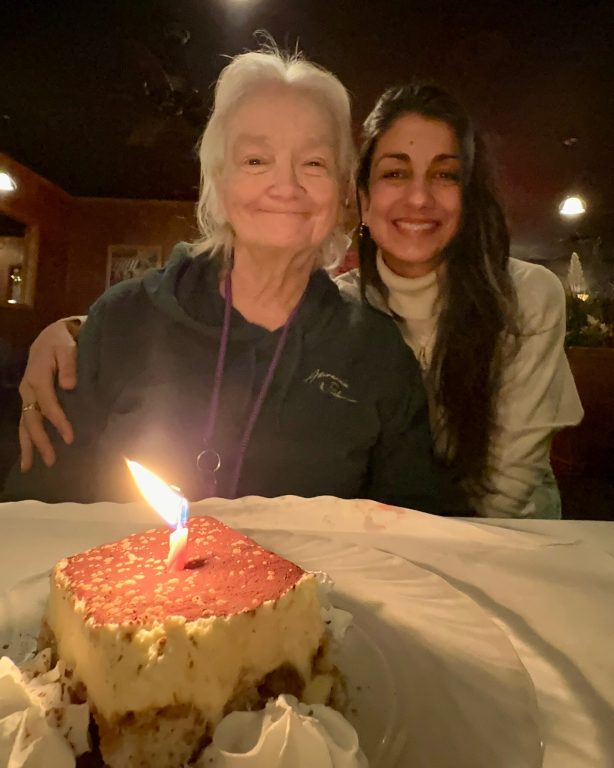
Sharon Dixon and Jessica Fenner celebrate Dixon’s birthday in January of 2025. Photo courtesy Jessica Fenner
But when Fenner found out that Dixon was unhoused and living on the street, she and others went into action helping her find medical care and stable housing. They also started a fundraising campaign for her.
“You were actually kind of like a lifesaver,” Dixon told Fenner during an interview with “Wisconsin Today.”
An ‘Old Timers reunion party’
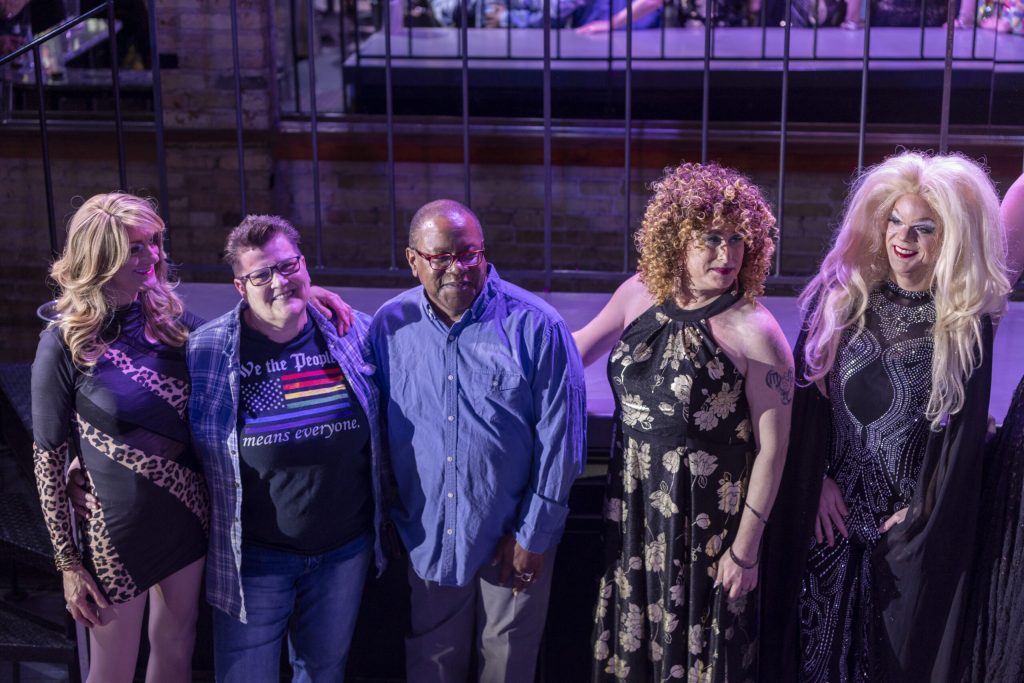
Performers pose together at a fundraiser for LGBTQ+ pioneer Sharon Dixon on March 30, 2025 at La Cage nightclub in Milwaukee. From left to right: Britney Morgan, Dianna Jones, Corky Morgan, Judy Bownz and Esther Talopram. Cormac Kehoe/Wisconsin LGBTQ History Project
At the celebration in March, Dixon’s supporters wanted to repay her for her past service. But they also wanted to pay it forward.
“One of our concerns and things that we want to do is help our elders,” said Diane Gregory, board member of the Wisconsin LGBTQ History Project and former employee of Dixon’s. “Sharon has no family. There’s many of us that are in that situation.”
“I don’t think I’d be where I am today,” said Glynis Grochowski, a long-time patron of Dixon’s. “I met my wife and danced [our] first dance at Sharon’s Fannies, and we’ve been together 31 years.”
Jones addressed her thanks directly to Dixon: “You made a safe haven for all of us. You supported all of us. You made us all feel seen and heard and loved. And there’s not enough thanks on this planet to do you justice.”
Between the party and the ongoing fundraising efforts, the community has raised more than $10,000 for Dixon.
“I was deeply touched by a lot of it,” Dixon said.
‘Old Timers’ of Milwaukee’s LGBTQ+ community gather to celebrate a pioneer was originally published by Wisconsin Public Radio.
If you think stories like this are important, become a member of Urban Milwaukee and help support real, independent journalism. Plus you get some cool added benefits.


